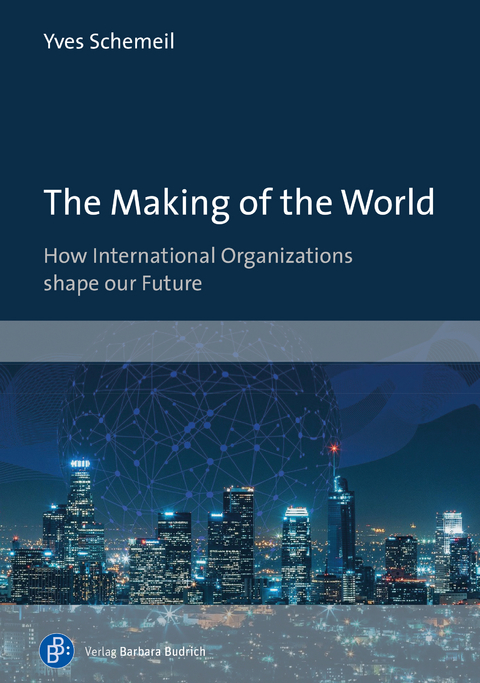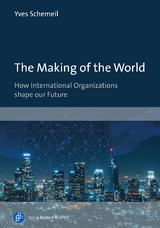The Making of the World
Verlag Barbara Budrich
978-3-8474-2146-7 (ISBN)
Yves Schemeil is Professor emeritus of Global and Comparative Politics and works in Grenoble, France. http://yves-schemeil.sciencespo-grenoble.fr
Introduction
The Institutional Puzzle
Methodological Solutions
The Network Growth Model
The Spirit of the Book
Part 1. What IOs Are and What We Think We Know
1 The Conventional Wisdom, First Cut: The Classics
1.1 A Taste for Typologies
1.2 An Exclusive Focus on IOs/States Relations
1.3 To Sum Up
2 The Conventional Wisdom, Second Cut: The Mavericks
2.1 Rejuvenating Old Paradigms
2.2 Bringing in New Paradigms
2.3 Discovering Organizational Mechanics
2.4 To Sum Up
Part 2. IOs as Complex Organizations
3 Homogenization and Hegemonization
3.1 Diversity
3.2 Similarity
3.3 To Sum Up
4 Centralization and Decentralization
4.1 Headquarters Matter! On the Importance of Being Central
4.2 Bottom Up, Top Down, or What?
4.3 To Sum Up
10
Part 3. A Predictive Model of IOs’ Behaviour
5 Explanatory Factors and Drivers of Change
5.1 External and Internal Change
5.2 Leadership, Management Styles, and Innovation
5.3 Organic and Cognitive Organizations
5.4 To Sum Up
6 The Trade-off Between Resilience and Performance
6.1 What Are the Relevant Indicators of Success?
6.2 Towards New Standards of Performance
6.3 To Sum Up
7 Genesis and Expansion
7.1 Genesis: How It All Started
7.2 Drivers of Expansion
7.3 To Sum Up
Part 4. From Competition to Cooperation
8 Too Big to Fail: From Expansion to Dissolution
8.1 Mandate Overlap
8.2 Survival Strategies
8.3 Death at the Crossroads
8.4 To Sum Up
9 Coordination, Collaboration, and Cooperation: How
Different Really?
9.1 Partnership Models
9.2 All in the Family: The Rush Towards Coordination
9.3 Accommodating Strangers: Occasional Collaboration
9.4 Pooling Resources: Acceptance of Full Cooperation
9.5 To Sum Up
10 The Taming of the Shrew: Avoiding the Other
10.1 A Shakespearian Dilemma: To Coordinate or not to Be
Coordinated?
10.2 The Great Fear: Side-lined, Shut Down, or Merged?
10.3 To Sum Up.
11 From Clusters to Networks
11.1 How Clusters Give Birth to Complex Organized Systems
11.2 Meta-organizations and their Limits
11.3 From Meta-organizations to Networks
11.4 To Sum Up
12 The Nature of Organizational Networks
12.1 How Much “Publicness” in International Organizations?
12.2 Going Hybrid
12.3 Interorganizational Networks
12.4 To Sum Up
13 The Properties of Organizational Networks
13.1 From Transaction Costs to Coordination Costs
13.2 The Threshold Effect and the End of Politics
13.3 To Sum Up
Part 5. How Likely is any Institutionalization of the World?
14 A Changing Structure
14.1 A Pivot Towards the Global South
14.2 The Coining of Fair Norms
14.3 The End of Securitization
14.4 To Sum Up
15 Is Institutionalized Globalization Inevitable?
15.1 A Likely Future: Plurilateralism Rules the World
15.2 Unlikely Alternatives: New Despotism and
New Medievalism
15.3 Likable Options: Constitutional Adaptation
15.4 To Sum Up.
16 Towards a World Government
16.1 Is Hobbes’ Constant as Limiting as Light Speed?
16.2 Making Bull’s Dream Come True?
16.3 Is Wendt’s Recognition Process Working?
16.4 Neither Micro nor Macro: A Mesocosmic World
16.5 Wrap up: From Warfare to Welfare and Back
17 Conclusion. What We Have Achieved and What Remains to
Be Done
17.1 Do Limitations Weaken the Explanatory Power of the
Network Growth Model?
17.2 Do Success Stories Suffice to Explain International
Organization and Organizations?
17.3 Beyond Research: Will this Book Be Helpful?
Afterword
Appendixes
Appendix 1: Primary sources
Appendix 2: Methodology
Appendix 3: List of interviews
Reference list
Subject Index
Schemeil nimmt die „Blackbox“ der internationalen Organisation in den Fokus, wobei er sich mehr für Netzwerke und Dynamiken der Kooperation und Institutionalisierung, als auf einzelne Institutionen konzentriert. Hierfür greift er u.a. auf theoretische Ansätze wie das Network Growth Model zurück, bezieht sich aber auch auf langjährige Erfahrungen an und mit internationalen Organisationen.
C3-Bibliothek für Entwicklungspolitik, 9/2023
"The book presents a distinctive viewpoint in the field of literature by examining IOs from an internal perspective, considering them as autonomous institutions rather than subordinate institutions to their member states and targeting successful examples contrary to many scholars. I highly recommend the book, particularly to young scholars, as Schemeil provides a comprehensive guide for anyone who is interested in conducting research, composing a thesis, or engaging in academic study on the given topic."
ULUSLARARASI İLİŞKİLER / INTERNATIONAL RELATIONS, 02/2024
"The book is enriched with a wealth of knowledge, anecdotes, and narratives that effectively illustrate and support Schemeil's arguments, offering a comprehensive and engaging analysis of the pivotal roles international organizations play in the global arena."
Swiss Political Science Review (SPSR) / Revue Suisse de Science Politique (RSSP), 09/2024
| Erscheinungsdatum | 19.04.2023 |
|---|---|
| Verlagsort | Leverkusen-Opladen |
| Sprache | englisch |
| Maße | 148 x 210 mm |
| Gewicht | 585 g |
| Themenwelt | Sozialwissenschaften ► Politik / Verwaltung ► Politische Systeme |
| Sozialwissenschaften ► Politik / Verwaltung ► Staat / Verwaltung | |
| Schlagworte | Außenpolitik • development for the poorest • globale Öffentlichkeit • globale Zukunft • global future • global public • Global Studies • Internationale Beziehungen • Internationale Organisationen • international organziations • International Relations • interstate conflicts • Io • IO network • IO-Netzwerk • Networks • Netzwerke • Organisationen • Organizations • snowballing processes • trade for the richest • World Politics • zwischenstaatliche Konflikte |
| ISBN-10 | 3-8474-2146-8 / 3847421468 |
| ISBN-13 | 978-3-8474-2146-7 / 9783847421467 |
| Zustand | Neuware |
| Informationen gemäß Produktsicherheitsverordnung (GPSR) | |
| Haben Sie eine Frage zum Produkt? |
aus dem Bereich




